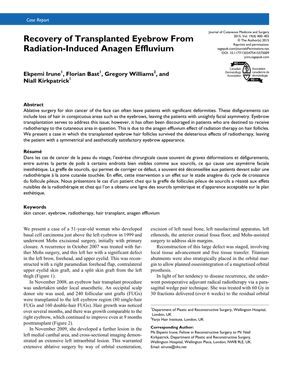Recovery of Transplanted Eyebrow From Radiation-Induced Anagen Effluvium
March 2015
in “
Journal of Cutaneous Medicine and Surgery
”

TLDR Eyebrow hair transplants can regrow after high-dose radiation therapy.
The document reports a case of a 51-year-old woman who underwent multiple surgeries and radiotherapy for basal cell carcinoma near her left eyebrow, resulting in significant hair loss. She received an eyebrow hair transplant in 2008, which showed successful growth comparable to her right eyebrow. However, after further cancer treatment and receiving a high dose of radiotherapy (60 Gy) in 2009, she experienced complete hair loss of the transplanted eyebrow. Remarkably, the eyebrow hair regrew completely within 12 weeks post-radiotherapy. This case is significant because it challenges the expectation that such a high dose of radiation would permanently damage transplanted hair follicles due to anagen effluvium. The document concludes that follicular unit graft (FUG) hair transplantation should be considered in the reconstructive treatment of facial skin cancer patients, even if they may require subsequent radiotherapy.









